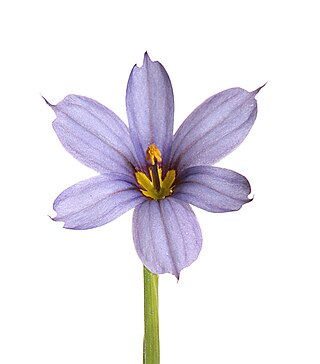Top Qs
Timeline
Chat
Perspective
Sisyrinchium angustifolium
Plant species in the iris family From Wikipedia, the free encyclopedia
Remove ads
Sisyrinchium angustifolium, commonly known as narrow-leaf blue-eyed-grass,[3] is a herbaceous perennial growing from rhizomes, native to the eastern United States, stretching as far west as Texas and Kansas, where it is the most common blue-eyed grass. It is commonly cultivated as an ornamental.
Remove ads
Description
Height: 15–50 cm (6–20 in). Stem: broadly winged, 2–4 mm (1⁄16–3⁄16 in) wide, usually branched. Leaves: 2–6 mm (1⁄16–1⁄4 in) wide. Tepals: 6, blue,[4] 7–10 mm (1⁄4–3⁄8 in), each tipped with a sharp point, veined, and darkening toward central yellow patch.
Ecology
Habitat
S. angustifolium is most commonly found in habitats such as woodlands, meadows, and sandhill swales.[5]
This species possesses an intermediate shade tolerance and is adapted to both fine and medium-textured soils.[6]
Phenology
S. angustifolium tends to flower from January to May, with peak inflorescence occurring in the spring, around April.[7]
Gallery
- Many in a hedge
- Flowers, stem, and leaves
- Bud before flowering and immature fruits
- flower, close
- Mature fruits, having released the seeds
References
Further reading
Wikiwand - on
Seamless Wikipedia browsing. On steroids.
Remove ads







